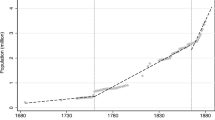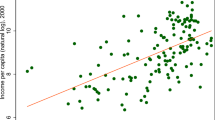Abstract
Using an overlapping generations model in which human capital accumulation has positive external effects on the production of the human capital of future generations, this paper analyzes implications of agents’ having preferences for educational status, represented by human capital holdings relative to the social average. Examining the value and sign of the optimal distortionary tax in the optimal taxation scheme, we analyze the efficiency of the level of human capital accumulation in a decentralized economy. The desire for educational status can compensate for insufficient accumulation of human capital stemming from human capital externalities directed toward future generations.
Similar content being viewed by others
References
A.B. Abel (2005) ArticleTitleOptimal Taxation When Consumers Have Endogenous Benchmark Levels of Consumption Review of Economic Studies 72 21–42 Occurrence Handle10.1111/0034-6527.00322
J. Benhabib R. Perli (1994) ArticleTitleUniqueness and Indeterminacy: On the Dynamics of Endogenous Growth Journal of Economic Theory 63 113–142 Occurrence Handle10.1006/jeth.1994.1035
O.J. Blanchard S. Fischer (1989) Lectures on Macroeconomics MIT Press Cambridge, MA
C.P. Chamley (1993) ArticleTitleExternalities and Dynamics in Models of `Learning or Doing' International Economic Review 34 583–610 Occurrence Handle10.2307/2527183
C. Clemens (2004) ArticleTitleStatus, Risk-taking and Intertemporal Substitution in an Endogenous Growth Model Journal of Economics 83 IssueID2 103–123 Occurrence Handle10.1007/s00712-004-0079-5
H.L. Cole G.J. Mailath A. Postlewaite (1992) ArticleTitleSocial Norms, Savings Behavior, and Growth Journal of Political Economy 100 IssueID6 1092–1125 Occurrence Handle10.1086/261855
G. Corneo O. Jeanne (1997) ArticleTitleOn Relative Wealth Effects and the Optimality of Growth Economics Letters 54 87–92 Occurrence Handle10.1016/S0165-1765(96)00940-8
G. Corneo O. Jeanne (2001a) ArticleTitleOn Relative-wealth Effects and Long-run Growth Research in Economics 55 349–358 Occurrence Handle10.1006/reec.2001.0260
G. Corneo O. Jeanne (2001b) ArticleTitleStatus, the Distribution of Wealth and Growth Scandinavian Journal of Economics 103 283–293 Occurrence Handle10.1111/1467-9442.00245
M.B. Devereux D.R.F. Love (1994) ArticleTitleThe Effects of Factor Taxation in a Two-sector Model of Endogenous Growth Canadian Journal of Economics 27 509–536 Occurrence Handle10.2307/135781
P.A. Diamond (1965) ArticleTitleNational Debt in a Neoclassical Growth Model American Economic Review 55 IssueID5 1126–1150
C. Fershtman K.M. Murphy Y. Weiss (1996) ArticleTitleSocial Status, Education, and Growth Journal of Political Economy 104 IssueID1 108–132 Occurrence Handle10.1086/262019
W.H. Fisher F.X. Hof (2005) ArticleTitleStatus Seeking in the Small Open Economy Journal of Macroeconomics 27 209–232 Occurrence Handle10.1016/j.jmacro.2004.01.001
K. Futagami A. Shibata (1998) ArticleTitleKeeping One Step Ahead of the Joneses: Status, the Distribution of Wealth, and Long-run Growth Journal of Economic Behavior and Organization 36 109–126 Occurrence Handle10.1016/S0167-2681(98)00072-9
K.A. Konrad (1992) ArticleTitleWealth Seeking Reconsidered Journal of Economic Behavior and Organization 18 215–227 Occurrence Handle10.1016/0167-2681(92)90028-A
R.E. Lucas SuffixJr. (1988) ArticleTitleOn the Mechanics of Economic Development Journal of Monetary Economics 22 3–42 Occurrence Handle10.1016/0304-3932(88)90168-7
G.M. Milesi-Ferretti N. Roubini (1998) ArticleTitleGrowth Effects of Income and Consumption Taxes Journal of Money, Credit and Banking 30 721–744 Occurrence Handle10.2307/2601126
P.M. Romer (1986) ArticleTitleIncreasing Returns and Long-run Growth Journal of Political Economy 94 IssueID5 1003–1037 Occurrence Handle10.1086/261420
Author information
Authors and Affiliations
Corresponding author
Rights and permissions
About this article
Cite this article
Kawamoto, K. Preferences for Educational Status, Human Capital Accumulation, and Growth. J Econ 91, 41–67 (2007). https://doi.org/10.1007/s00712-006-0244-0
Received:
Revised:
Published:
Issue Date:
DOI: https://doi.org/10.1007/s00712-006-0244-0




